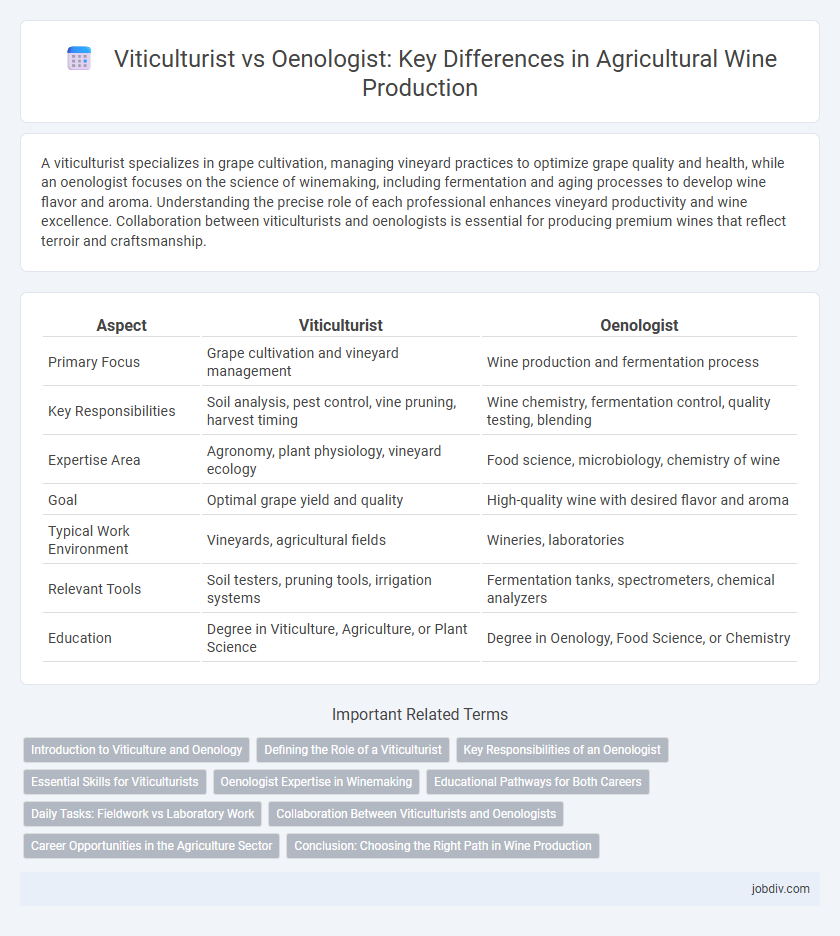A viticulturist specializes in grape cultivation, managing vineyard practices to optimize grape quality and health, while an oenologist focuses on the science of winemaking, including fermentation and aging processes to develop wine flavor and aroma. Understanding the precise role of each professional enhances vineyard productivity and wine excellence. Collaboration between viticulturists and oenologists is essential for producing premium wines that reflect terroir and craftsmanship.
Table of Comparison
| Aspect | Viticulturist | Oenologist |
|---|---|---|
| Primary Focus | Grape cultivation and vineyard management | Wine production and fermentation process |
| Key Responsibilities | Soil analysis, pest control, vine pruning, harvest timing | Wine chemistry, fermentation control, quality testing, blending |
| Expertise Area | Agronomy, plant physiology, vineyard ecology | Food science, microbiology, chemistry of wine |
| Goal | Optimal grape yield and quality | High-quality wine with desired flavor and aroma |
| Typical Work Environment | Vineyards, agricultural fields | Wineries, laboratories |
| Relevant Tools | Soil testers, pruning tools, irrigation systems | Fermentation tanks, spectrometers, chemical analyzers |
| Education | Degree in Viticulture, Agriculture, or Plant Science | Degree in Oenology, Food Science, or Chemistry |
Introduction to Viticulture and Oenology
Viticulturists specialize in the cultivation and management of grapevines, focusing on soil health, climate conditions, and pest control to optimize grape quality. Oenologists concentrate on the science of winemaking, including fermentation processes, chemical analysis, and aging techniques to produce high-quality wine. Both disciplines are integral to the wine industry, combining agronomic knowledge with enological expertise to enhance grape production and wine craftsmanship.
Defining the Role of a Viticulturist
A viticulturist specializes in the science and practice of grapevine cultivation, focusing on vineyard management, soil health, and pest control to optimize grape quality and yield. Their expertise in vine growth stages and environmental factors directly influences grape production and the characteristics of the harvested fruit. This role is distinctly separate from an oenologist, who primarily concentrates on winemaking processes and fermentation techniques.
Key Responsibilities of an Oenologist
An oenologist specializes in the science of winemaking, overseeing fermentation processes, managing wine aging, and ensuring quality control throughout production. They analyze grape composition, monitor chemical changes, and implement techniques to enhance flavor profiles and stability. Collaboration with viticulturists ensures the transition from vineyard to winery maximizes grape potential and produces high-quality wines.
Essential Skills for Viticulturists
Viticulturists require expertise in soil science, pest management, and vineyard ecology to optimize grape quality and yield. Proficiency in plant physiology and irrigation techniques is crucial for managing vine health and adapting to climate variability. These skills differentiate viticulturists from oenologists, who focus on winemaking processes and fermentation management.
Oenologist Expertise in Winemaking
An oenologist specializes in the science and art of winemaking, focusing on fermentation processes, yeast management, and aging techniques to enhance wine quality. Their expertise spans chemical analysis, sensory evaluation, and vineyard management collaboration to optimize grape characteristics for superior wine production. Unlike viticulturists who primarily manage vine cultivation, oenologists drive the final product's taste, aroma, and stability through advanced technological and biochemical interventions.
Educational Pathways for Both Careers
Viticulturists typically pursue degrees in agricultural science, horticulture, or plant biology, with specialized courses in grapevine physiology, pest management, and soil science to optimize vineyard management. Oenologists often follow a pathway in food science, chemistry, or enology, focusing on fermentation science, wine microbiology, and sensory analysis to master winemaking processes. Both careers may require hands-on internships and research projects to develop expertise in grape cultivation and wine production, respectively.
Daily Tasks: Fieldwork vs Laboratory Work
Viticulturists focus on daily fieldwork tasks such as monitoring vine growth, managing pests, and optimizing soil conditions to ensure healthy grape production. Oenologists primarily perform laboratory work involving the analysis of grape samples, fermentation processes, and quality control to produce high-quality wine. Both roles are essential, with viticulturists optimizing vineyard conditions and oenologists refining the winemaking process.
Collaboration Between Viticulturists and Oenologists
Viticulturists and oenologists collaborate closely to optimize grape quality and wine production, combining expertise in vineyard management and fermentation science. Viticulturists focus on grape growing conditions, soil health, and pest control, while oenologists concentrate on fermentation processes, flavor development, and wine stability. Their collaboration ensures that viticulture practices align with winemaking goals, enhancing overall wine quality and consistency.
Career Opportunities in the Agriculture Sector
Viticulturists specialize in grapevine cultivation, offering career opportunities in vineyard management, pest control, and sustainable farming practices, essential for quality grape production. Oenologists focus on wine science and production, opening roles in wine making, quality control, and research within wineries and wine laboratories. Both professions are critical in the agriculture sector, driving innovation and quality from grape growing to wine crafting.
Conclusion: Choosing the Right Path in Wine Production
Selecting the right path in wine production depends on whether the focus is on grape cultivation or wine-making processes; viticulturists specialize in optimizing vineyard health and grape quality, while oenologists concentrate on fermentation, aging, and flavor development. Effective collaboration between viticulture and oenology professionals enhances overall wine quality and market success. Understanding the distinct roles and expertise of each field ensures informed decisions for aspiring wine industry specialists.
Viticulturist vs Oenologist Infographic

 jobdiv.com
jobdiv.com